A deep dive into the life and legacy of Diogo Jota following his untimely death.

Topics covered
The untimely passing of Diogo Jota, a talented footballer, has sent shockwaves through the sports community. The Liverpool forward was involved in a tragic car accident in Spain, a loss that comes just weeks after celebrating a significant personal milestone—his marriage.
But what does this tragedy reveal about the fragility of life in professional sports and the enduring impact of athletes on their communities?
Understanding the Impact of Loss in Sports
Jota’s death serves as a stark reminder of the harsh realities athletes face.
While we often glamorize their lives, they are intertwined with risks that can lead to sudden tragedies. The outpouring of grief from fans, teammates, and clubs showcases the deep connections formed through sport. Losing an athlete like Jota, who represented his nation with pride and skill, resonates far beyond the pitch.
It prompts us to reflect on the fragility of life and emphasizes the importance of cherishing those we admire.
Statistics paint a sobering picture of athlete mortality and the inherent risks associated with fame and fortune. While the football community mourns, it’s essential to address the underlying issues that can lead to such tragedies. The pressure of public scrutiny, the demands of competition, and the personal challenges athletes face are often overlooked. Jota’s accident serves as a wake-up call, highlighting the need for mental health support and awareness in sports.
Case Studies: The Impact of Athlete Tragedies
Throughout history, we’ve seen numerous untimely losses in the sports world that have left lasting impacts on fans and communities. Take, for instance, the tragic passing of basketball legend Kobe Bryant, which shocked the world and sparked vital conversations about legacy, mental health, and the unique pressures athletes endure. Similarly, the death of NFL star Sean Taylor underlined the vulnerabilities athletes encounter, even outside their sporting arenas.
These cases illuminate a recurring theme: the sports community often rallies together in the face of tragedy, leading to heightened awareness and advocacy for mental health initiatives. Jota’s legacy, though abruptly cut short, has the potential to ignite similar conversations. By remembering him not just as an athlete but as a person who brought joy to many, we can honor his memory in a way that truly matters.
Lessons for Athletes and Communities
The loss of Diogo Jota serves as a crucial reminder of the necessity for stronger support systems within the sports community. Athletes frequently operate under immense pressure, and we cannot overstate the importance of mental well-being. Organizations and clubs must prioritize mental health resources, creating environments where athletes feel safe to share their struggles.
Moreover, fans and communities should recognize their role in supporting athletes beyond the game. This means understanding the human experiences that lie beneath the surface of athletic performance and fostering a culture of compassion and empathy. The legacy of athletes like Jota can be honored through advocacy, support, and awareness, transforming tragic events into opportunities for growth and change.
Actionable Takeaways
- Prioritize mental health: Sports organizations need to develop comprehensive programs that address the mental health needs of athletes.
- Foster community support: Fans should engage in discussions about the pressures athletes face, creating an environment of understanding.
- Honor legacies meaningfully: Use the memory of athletes to inspire initiatives that promote well-being and awareness in sports.
In conclusion, the tragic loss of Diogo Jota presents an opportunity for reflection and action. By addressing the complexities of life as an athlete and fostering a supportive community, we can ensure that their legacies continue to inspire future generations.




